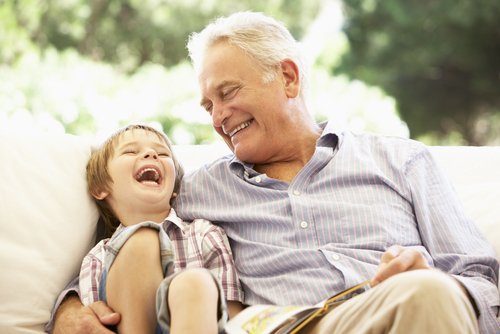The Importance of Teaching Children to Respect Elders

It’s common for older generations to spend a lot of time with children. Setting an example is a basic way to teach children to respect elders, including their customs, beliefs and ways of life.
Today’ culture is one of advanced technology and immediacy. The distance that modern social media can create tends to accentuate generational gaps and create an abyss between us.
However, encouraging respect for elders is a wonderful and effective way to combat this phenomenon. It’s beneficial not only for children, but for their grandparents as well.
How to teach children to respect elders
Getting old is the last stage in the cycle of life. Natural changes affect our bodies, our mobility, and our senses. This tends to produce strong emotions in those who are facing old age, and sometimes profound isolation.
Senior citizens who are lonely are more likely to fall into depression, which in turn makes their health even worse.
Encouraging respect for elders should flow from a foundation of loving care by younger adults. An active grandparent who spends time with his or her grandchildren, participates in family life, travel and festivities is less likely to suffer the weight of old age.
It’s true that sometimes relationships between different generations can take some work. Children today grow up with different rules.
It’s common for there to be differences of opinion in regards to how to solve daily problems. This is especially true, of course, when it comes to raising children.

On top of that, it’s important to remember that children now live in an age where technology seems to solve everything. Therefore, they may come to think they have nothing in common with their grandparents.
Closing the generational gap
Bringing distant generations together can be even more difficult when parents don’t have a good relationship with their children’s grandparents or other older individuals. The tendency to overestimate youth and look down on old age is nothing new.
In this sense, obstacles that often get in the way of respect for elders are stereotypes and prejudices.
In other times and other regions, it was the elders who passed on wisdom to their people. However, in our modern culture, digital resources seem to have replaced this valuable social function.
The United Nations created a program in 2017 with the goal of tearing down stereotypes regarding old age and encouraging respect for senior citizens. The program aims to tap into “the talents, contributions and participation of older persons in society.”
Therefore, on October 1st of every year, we celebrate the International Day of Older Persons. By searching the hashtag #InternationalDayOfOlderPersons on social media, you can find photographs of older adults carrying out daily activities just like anyone else.
This reinforces feelings of equality that go beyond age, and takes away prejudice when it comes to encounters between grandchildren and grandparents.
The benefits of interactions between generations
Teaching and encouraging respect towards older people translates into great benefits for the elderly and children alike. Human beings are intergenerational by definition.
Of course, it isn’t just about respecting the oldest members of our families. It’s also about respecting teachers, neighbors, and other older adults in a child’s environment.

“An active grandparent who spends time with his or her grandchildren, participates in family life, travel and festivities is less likely to suffer the weight of old age”
Older people who receive affection and respect from children experience positive mood changes and a significant increase in vitality. It also distances them from loneliness, makes them feel like active participants in society, and increases self love. These are just a few of the many benefits for the elderly.
As for children and youth, the benefits of having caring and respectful relationships with senior citizens are also significant. These relationships also strengthen their feelings of social support and stability.
The wisdom and advice of grandparents and older adults are forever present in the memory of children. At the same time, accepting old age as a part of life reduces anxiety and the fear of growing up.
In conclusion, encouraging respect for elders is a way to bring our children and our parents closer together. Respect for others makes all the difference, and should prevail in all of our relationships.
All cited sources were thoroughly reviewed by our team to ensure their quality, reliability, currency, and validity. The bibliography of this article was considered reliable and of academic or scientific accuracy.
- Wild, R. (2011). Libertad y límites. Amor y respeto: Lo que los niños necesitan de nosotros. Herder Editorial.
- Miralles, I. (2010). Vejez productiva: El reconocimiento de las personas mayores como un recurso indispensable en la sociedad. Kairos: Revista de temas sociales, (26), 4. https://dialnet.unirioja.es/servlet/articulo?codigo=3702472
- Morales Jaimes, O. D., & Silvera López, D. G. (2019). INFLUENCIA DE LOS JUEGOS COOPERATIVOS EN EL DESARROLLO DEL VALOR DE RESPETO EN LOS NIÑOS Y NIÑAS DE LA INSTITUCIÓN EDUCATIVA INICIAL Nº 33″ CORAZÓN DEL NIÑO JESÚS” DE LA TINGUIÑA-ICA. http://repositorio.unh.edu.pe/handle/UNH/3030
This text is provided for informational purposes only and does not replace consultation with a professional. If in doubt, consult your specialist.








